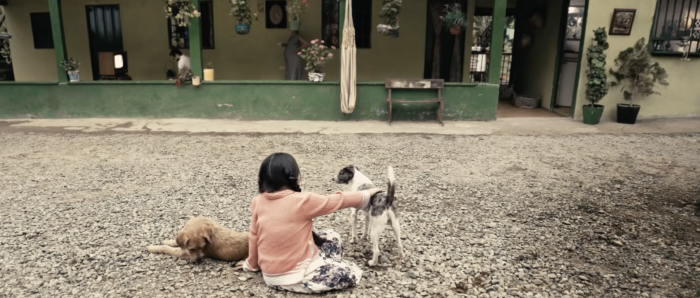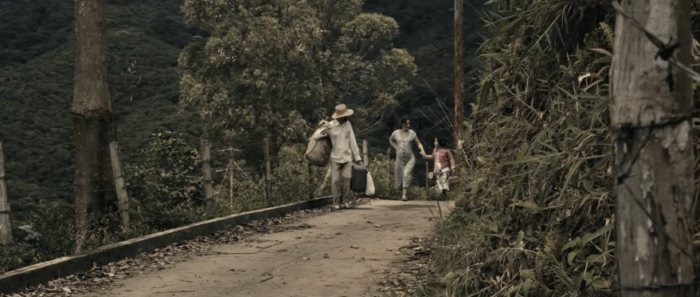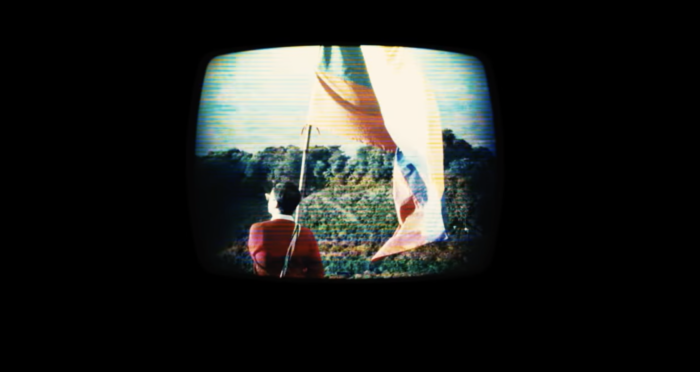Colombian Artists Reflect on Rural Violence and Memory in Short Film
31 August, 2021In the short film ‘Desolvido’, Colombian musicians and activists Edson Velandia and Adriana Lizcano combine folk music and simple lyrics with the potent visuals of director Andrés Roa, in a fierce and affecting meditation on violence in rural Colombia. [This article is republished courtesy of Latin America Bureau and was originally published here.]
Told entirely in reverse, this Colombian short film depicts how the life of a rural family is interrupted, as they are displaced and ultimately brutalised by armed groups. The work presents a depiction of both the ongoing armed conflict in rural Colombia and the effects of recent cuts to public healthcare – which have provoked nationwide protests.
The film and song’s title, Desolvido, translates as ‘unforgetting’; evoking a desire not to forget past moments of beauty even in the face of a violent present. Velandia describes how the lyrics, which recount memories of childhood innocence and simplicity, convey ‘that place of play, dreams, fantasy and contemplation, where one’s mind is still free and unblemished’. In stark contrast, images of cruelty and despair give the lyrics a sense of tragic irony, highlighting the injustice of a conflict which has claimed the lives of so many children.
Colombia has been in a state of low-intensity armed conflict for over half a century, with some of the worst violence being concentrated in rural areas. Despite nominally being a conflict between government forces and various armed paramilitary groups and crime syndicates, its victims have overwhelmingly been civilians, who account for over 177,000 of the 200,000 dead, with a further five million civilians being displaced from their homes between 1985 and 2012, among them two million children.
Director Andres Roa, a native of the rural province of Quindío in which the film was shot, states: ‘We wanted to tell one story with the music and another with the video, but in a way that worked together as one piece. The countryside is beautiful, but at the same time there is a dark side to it associated with the war. We decided that we were going to tell both stories: the beauty with the music, and the harshness with the video’.

¿Quién dio la orden?
The film also brings into focus another significant strain on rural life: the lack of adequate access to hospitals and healthcare. Following the family’s displacement, they reach a rural hospital as the heavily pregnant mother goes into labour, only to find it has been shut down and abandoned. Clutching a statue of the Virgin outside the locked doors, it is implied that she dies following a miscarriage on the hospital’s steps.
The walls of the hospital have been marked by the protest slogan ‘¿Quién dio la orden?’—a reference to the government’s role in the extrajudicial murdering of civilians between 2000 and 2010, suggesting the mother’s death is the result of governmental neglect: a form of state violence.
This scene also has more contemporary resonance: since April 28 2021, Colombia has been in a state of nationwide protest, provoked by neoliberal president Iván Duque Márquez’s proposed reforms in response to the COVID 19 pandemic (including tax increases affecting the poorest in society and drastic cuts to the public healthcare system). The government’s response to the protests has been characterised by intense repression and state violence, with over 2000 cases of police brutality reported, at least 27 of them sexual, as well as 200 disappearances. The film therefore not only alludes to decades of past conflict but also to the contemporary situation, highlighting the devastating human cost of further reducing the rural population’s access to healthcare.

Changing the narrative through the ‘paro nacional‘
Velandia, who along with Adriana Lizcano lives in the small rural town of Piedecuesta, Santander, has himself declared that the short film is intended as an expression of solidarity with the current strike. ‘As cruel as the video is,’ he states, ‘it embodies the feeling of those who are taking a stand in this paro [national strike]. We can turn this story around.’
The desire to ‘turn things around’ and alter the course of a cruel and violent history is most tangible in the film’s ingenious use of rewound footage, and its resultant reverse chronology. The video begins with the worst moments of violence and despair but ends with the family peaceful and happy. But these formal techniques arguably give the opening acts of violence a sense of irreversibility – they have already happened, and exist in the viewer’s mind even during the happier closing scenes. This effect gives the sense that a happy ending can only be attained if the nature of time itself is fundamentally altered, reflecting how deeply ingrained violence has become in day-to-day life in rural Colombia.
The film’s final sequence zooms in on the family’s television screen to footage of famous satirist and peace activist Jaime Garzón, who was assassinated by far-right militia in 1999. A collage of some of Garzón’s most beloved characters evokes a dreamlike nostalgia, positively aligning the sentiment in the lyrics and the images for the first time.

We see Garzón holding the Colombian flag aloft and looking out over the rural landscape, suggesting his fearless commitment to speaking truth to power and corruption in the pursuit of peace is synonymous with the spirit of the nation. The final shots, however, reveal an unidentified soldier pointing a gun at the back of Garzón’s head, echoing the execution with which the film begins and once again suggesting the doomed nature of such a spirit when violence remains a perennial fact of life.
Despite the fatalism conveyed in the film, Velandia remains optimistic about the possibility of lasting social change, and even a redefinition of national history, as a result of the current wave of popular protest that has spread throughout the country:
‘Going back in time, we don’t have to make the same mistakes again, like the murder of Jaime Garzón. And this is what the protests are achieving: people are getting rid of old monuments of the war in Colombia. Hegemonic history is collapsing [with the paro nacional], just as hegemonic representations of the war collapse in this film’.
Follow Sounds and Colours: Facebook / Twitter / Instagram / Mixcloud / Soundcloud / Bandcamp
Subscribe to the Sounds and Colours Newsletter for regular updates, news and competitions bringing the best of Latin American culture direct to your Inbox.

